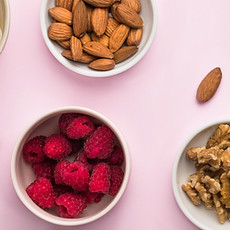
Fiber and Diabetes
When someone says “diabetic” what’s the first thing that comes to mind? You’re probably thinking a “sugar”. If you’re wondering what that means for your diet, you’ve come to the right place.
The diabetic diet is a way for you to have some control over your health by choosing foods that will help manage blood sugars. The diabetic diet can also improve the outcome of your medication.
But the diabetic diet is more than watching sugar intake: it’s eating balanced meals to help slow down how quickly your blood sugars spike. Fiber plays a huge role regulating blood sugars to avoid those “sugar spikes” that can wear on your health.
Easy fiber friendly changes:
-
Switch out white grains for whole grains. Planning pasta for dinner? Choose whole grain options instead. Packing a sandwich for lunch? Let’s try whole wheat bread. Swap out that morning cereal with a high fiber option (5+ grams per serving). This simple switch can really help your body maintain balanced blood sugar levels. Whole grains are the number one source of fiber in a health promoting diet.
-
Choose fruit for dessert. Swap out dessert choices or afternoon snacks with an apple, banana, berries, or any other fruit. Fruit has lots of fiber beneficial for gut health and for blood sugar management. Plus, the sugar in fruit carries beneficial antioxidants making this choice a win-win.
-
Add vegetables to your meal. Whether canned, frozen, or fresh, vegetables add a lot of fiber to your diet. Vegetables are the second main source of fiber in a health promoting diet.
-
Make your snacks count. Nuts have a handful of nutrients including fiber, protein, and health promoting fats. Throw them in your bag when you’re on the go for a healthy snack option on the go.
-
Don’t forget your beans. Beans and legume are highly nutritious and contain an amazing amount of fiber. Try swapping your soup for minestrone, lentil, or butternut squash soup.
Snack Ideas
-
Cut up fresh bell peppers, cucumbers, and celery into sticks and dip
them in a dressing, hummus, or plain -
Yogurt parfait with blueberries, strawberries, raspberries and granola.
-
Trail mix: buy or make your own! Nuts, seeds, and dried fruit
-
Popcorn: great for when you’re not hungry, but feeling "snacky"
-
Whole grain crackers and cheese
-
Cut fruit (apples, oranges)

Adding Fiber to Your Meals
-
Open a can of beans and add them to your salad
-
Steaming vegetables have never been easier: buy some bags of
microwavable veggies (ie: broccoli). Microwave and toss with
some olive oil and salt as a side to your meal. -
Add beans to nachos
-
Crock pots have made soups that much easier to prepare for.
Throw some stock, cut veggies, beans, and seasoning into your crock pot
for a high fiber soup.

Tips
-
Whenever you increase your dietary fiber, make sure you’re mindful of
fluid intake as well! Without enough water, fiber could cause
constipation. You may also experience gassiness; however, this is
likely temporary: your gut is undergoing some change and will
eventually adapt to its newfound fiber-full diet. -
Going full grain is a commitment not everyone is ready for.
If this is you, try half and half and move up when you’re ready. -
A diet is an overall average of what you eat. Don’t let the
unintentionally from today discourage you from progress
tomorrow. A diet isn’t going to be “perfect”, and practice
makes progress. -
Craft your meals to have at least 3 colors on your plate. Colors carry
phytochemicals and other micro nutrients that are beneficial for your health. -
Planning is a proven method to success. By planning out meals for the week, you create intentionality for your health.
-
Talk to a registered dietitian, who can help personalize your meal plan, answer questions you may have, and help motivate you along the way. You’re not alone.

About the Author
Tatiana Jeon is a Registered Dietitian. Having practiced largely in California and Hawaii, Tatiana is experienced in various fields of dietetics, including diabetic diet, CKD, heart health, oncology, general mental health, substance abuse nutrition, eating disorders, surgical recovery and rehabilitation, weight loss, and more. Consultation services coming soon.
123-456-7890
